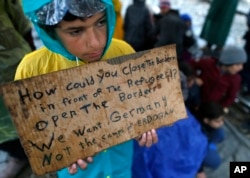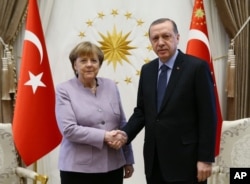A steady flow of German politicians has angrily condemned Turkish President Recep Tayyip Erdogan over his comments accusing Berlin of returning Germany to its Nazi past. Justice Minister Heiko Maas described the remark as "absurd, disgraceful and outlandish."
Sunday, Erdogan criticized Berlin for banning, on security grounds, two of his ministers from making speeches to ethnic Turks in Germany in support of April's referendum in Turkey on extending presidential powers.
"Germany, you have no relation whatsoever to democracy and you should know that your current actions are no different to those of the Nazi. Period," Erdogan said to his supporters.
German government spokesman Steffen Seibert also described Erdogan's comments as absurd, but added that people had to remain "calm and level-headed." Analysts say this restrained response is in part due to the fact that German Chancellor Angela Merkel faces re-election this year and needs Ankara's cooperation in continuing to stem refugee flows into Europe.
Ankara's rhetoric regarding Berlin is seen as unprecedented.
"We've never had this kind of escalation with Germany before and I would say this is serious," noted Semih Idiz, a political columnist for the Al-Monitor website. "I have noticed that the German side [is] playing the whole thing down and trying to control the situation, but all the [aggravation] is coming from the Turkish side and we haven't seen this before."
Tensions are likely to increase further after a German local authority Monday canceled at the last minute the use of a venue for a referendum meeting by Turkey's energy minister, Taner Yildiz.
Erdogan’s uncertainty
More than 3 million ethnic Turks live in Germany, of which 1.4 million can vote in the Turkish referendum. Some observers suggest Ankara's tough rhetoric toward Berlin is, in part, explained by the fact that Erdogan is struggling to convince the electorate ahead of the April referendum, with many opinion polls indicating the result is too close to call.
"Erdogan and his AK Party don't have the confidence that it has had in past polls that it will win," said political consultant Atilla Yesilada of Global Source Partners. Yesilada suggests Erdogan could be seeking to consolidate his support among conservatives and nationalist voters, by playing on historical fears.
"Turks do believe, across the party lines, that there is a global conspiracy to undermine Turkey. And the AKP [ruling party] spin masters have interpreted Germany allying itself with the 'No' camp. And Mr. Erdogan's defiance sounds very well to those who feel this Judeo-Christian alliance is trying to enslave Turkey," Yesilada said.
Trade, elections key
Devlet Bahceli, leader of the right-wing Nationalist Action Party, on Monday lent his support to Erdogan and said he would be prepared to join him if he chose to go to Germany to challenge any restrictions on speaking there. The Turkish president has threatened to go to Germany and promised to "stir up the world" if he is prevented from speaking with ethnic Turks.
Despite the angry words, analysts say Ankara will be mindful not to allow tensions to spin out of control, given Germany is Turkey's most important trading partner.
"Especially if we get a 'Yes' vote that comes out of it, then the next stage will be for government in Ankara to try and tone it all back," suggested columnist Idiz, but he warns it won't be easy. "I think it will have left a bitter taste in the mouths in Europe."
Given that much of Europe is in an election cycle, until those contests are concluded, how European leaders react to Turkey will likely remain unclear, but analysts warn that Ankara could end up paying a heavy price for its tough rhetoric.
"If Merkel wins again, I think then we will see the full might of the German response," predicted consultant Yesilada, "and I anticipate once this election cycle in Europe passes, that Europe will take swift and very severe measures against Turkey, which may reach economic and financial sanctions. Because Europe is getting sick and tired of Turkey's behavior."






